| |
Environment and Spiffy Clean
| |
| | We at Spiffy Clean are committed to environmental protection and water conservation. Water management and using only biodegradable chemicals are among our top priorities.
Spiffy Clean Car Wash is in the water management business. We use only state-of-the-art car wash technology that allows our facilities to treat 100% of wash water and we dispose of treated wash water only into approved water treatment facilities.
In an average home car wash, up to 150 gallons of water are used, and all this water goes untreated into storm drains, creeks, and eventually into our drinking water supply. By educating our customers and the general public on the environmental benefit of professional car washes, we hope to reduce the amount of untreated water that flows into our water supply. Spiffy Clean also offers a Charity Car Wash Program, which discourages wasteful and polluting “parking lot” car washes. | |
| | | In our Charity Car Wash Program or daily business practices, we strive to make the best use of our water resources and to educate our customers and the general public on the value of proper wastewater disposal. We believe this will directly improve the quality of water in our communities now and for years to come. | |
| | A CLEAN CAR IS A HAPPY CAR!! | |
Don't Let Washing Your Car Hurt Our Environment
|
| | Most of the storm drains in Catawba County flow directly to our lakes and streams. Dirty, soapy water from washing your car can pollute our surface waters.
One gallon of liquid soap will pollute 200,000 gallons of water.
Consider washing your car on a grassy area. Or better yet, take your car to a professional car washing center.
| 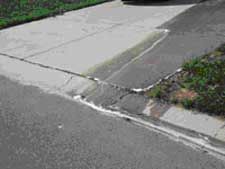 Don't let soap suds go
Don't let soap suds go
down the storm drain. | |
| |
What can be legally put down a storm drain?
| |
| | 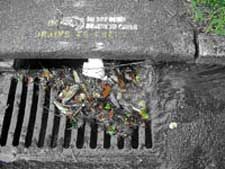 Remember, only rain goes Remember, only rain goes
down the storm drain! | The only thing that is supposed to go down a storm drain is rain. However, every cigarette butt, drop of oil or spilled chemical you see on the street will eventually wind up going down a storm drain and into a nearby creek. And that will eventually flow into a source of drinking water. | |
| |
Litter
| 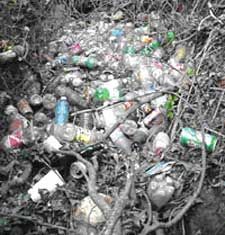
Litter clogs the path of
a small stream. | |
Anything that gets in the path of a rain drop becomes storm water pollution.
That includes litter.
Every year tons of litter and other debris is removed from creeks in Catawba County by volunteers.
Never throw anything down storm drains or out of car windows.
Remember to keep truck loads covered to avoid accidental littering. |
Household Hazardous Waste
|
Anything that mixes with rain becomes storm water pollution.
For that reason, it is important to dispose of household hazardous waste properly.
|
| |
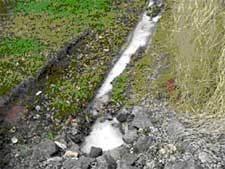
Paint can turn toxic when it
washes into a storm drain or stream. | What is household hazardous waste (HHW)? | |
| HHW are chemicals used in homes that are corrosive, ignitable, toxic or reactive and can present a threat or unreasonable risk to people or the environment. These materials turn into HHW when they are no longer usable or wanted. | |
| |
What are some examples of Household Hazardous Waste?
| |
| | |
- Used oil
- Antifreeze
- Bleach
- Turpentine
- Paint thinner
- Bug sprays/killers
- Paint
- Leftover pesticides and fertilizers
- Batteries
- Upholstery/rug cleaner
- Oven cleaners
- Drain openers
- Furniture polish
| 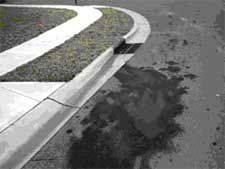 Oil on streets washes into Oil on streets washes into
our storm drains, polluting our
water and harming aquatic life. |
| |
Most HHW materials can be disposed of properly in Catawba County by taking them to one of the recycling centers.
Each year, people who change their own motor oil in the US dump more oil into the environment than the amount spilled by the worst oil tanker spill in US history.
Just one gallon of oil will pollute one million gallons of water. | |
| | |